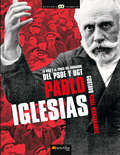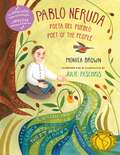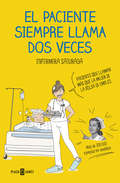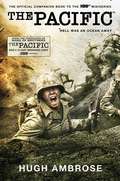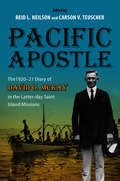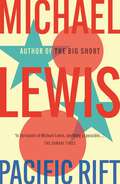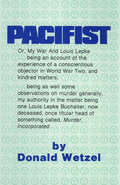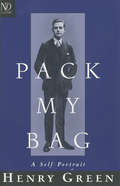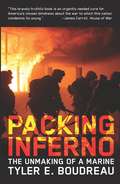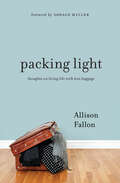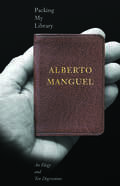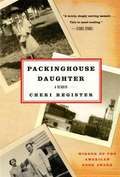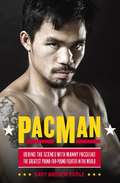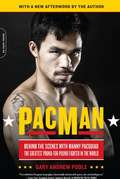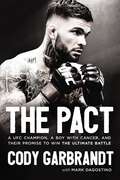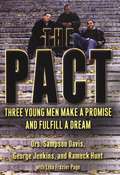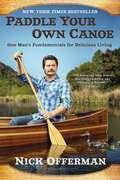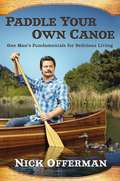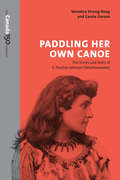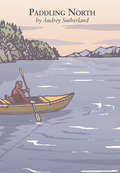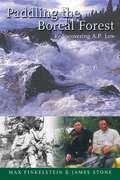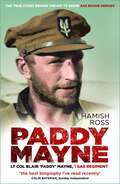- Table View
- List View
Pablo Iglesias (Historia Incógnita)
by Gustavo Vidal ManzanaresEste libro cuenta las facetas menos conocidas de Pablo Iglesias Posse: su niñez marcada por la pobreza en la que tenía que abrigarse con papeles bajo su vieja chaqueta, la muerte de su hermano por tuberculosis o cuando contemplaba a su madre pedir limosna… También se relata su juventud, su desarrollo y crecimiento intelectual y, por su puesto, toda su etapa adulta dura, difícil, cargada de detenciones, procesos, cárcel y hambre…
Pablo Neruda: Poet of the People
by Monica BrownOnce there was a little boy named Neftalí who loved wild things wildly and quiet things quietly. From the moment he could talk, he surrounded himself with words. Neftalí discovered the magic between the pages of books. When he was sixteen, he began publishing his poems as Pablo Neruda. Pablo wrote poems about the things he loved―things made by his friends in the café, things found at the marketplace, and things he saw in nature. He wrote about the people of Chile and their stories of struggle. Because above all things and above all words, Pablo Neruda loved people.
Pablo Neruda: Poet of the People / Poeta del pueblo (Bilingual Edition)
by Monica BrownA new Spanish and English bilingual edition of the stunning picture book biography of Pablo Neruda, one of the world's most enduring and popular poets, from the acclaimed Monica Brown.Había una vez un niño llamado Neftalí, quien amaba las cosas salvajes locamente y las cosas tranquilas serenamente. Desde el momento en que aprendió a hablar, se rodeó de palabras. Neftalí descubrió la magia oculta entre las páginas de los libros.Cuando tenía dieciséis años, comenzó a publicar sus poemas bajo el nombre Pablo Neruda. Pablo escribió poemas sobre las cosas que amaba: obras creadas por sus amigos artistas, objetos hallados en los mercados y elementos de la naturaleza. Escribió sobre la gente de Chile y su lucha por salir adelante. Porque sobre todas las cosas y sobre todas las palabras, Pablo Neruda amaba a la gente.Once there was a little boy named Neftalí who loved wild things wildly and quiet things quietly. From the moment he could talk, he surrounded himself with words, seeking comfort and inspiration from the magic he discovered between the pages of books.When he was sixteen, he began publishing his writing as Pablo Neruda. Pablo wrote poems about the things he loved—things made by his friends in the café, things found at the marketplace, and things he saw in nature. He wrote about the people of Chile and their stories of struggle. Because above all things and above all words, Pablo Neruda loved people.With a new translation of Monica Brown's lyrical text and Julia Paschkis' gorgeous art, which celebrates multiple languages, this new edition will introduce the youngest of readers—of English, Spanish, and both—to the legacy of one of history's most iconic talents.
El paciente siempre llama dos veces
by Enfermera SaturadaBienvenidas una vez más al mundo de la enfermería con humor. Bienvenidas a la aventura de vivir en primera persona la profesión más bonita del mundo. «Queridas Nightingales: Nos ha tocado vivir la profesión más bonita del mundo, esa que nos hace dar más vueltas que un vendaje compresivo, esa que una ejerce las 24 horas, sobre todo cuando tus amigas tienen su primer hijo o cuando tu prima quiere saber si puede mezclar antibióticos y alcohol. Os presento mis nuevas aventuras como enfermera eventual en Madrid.» ¿En serio creías que Satu ya lo había contado todo? Las aventuras de nuestra enfermera favorita continúan. Porque los pacientes siempre llaman dos veces, pero la mujer de la bolsa de empleo solo una, y más te vale estar atenta. El suero se ha terminado, las bombas han dejado de pitar y a Satu le toca despertar del que había sido el mejor contrato de verano, o no. Porque la vida de una enfermera da más vueltas que un vendaje compresivo, y los caminos del cuidado nunca sabes por dónde te van a llevar. Enfermera Saturada se define como una enfermera española que busca hacerse un hueco en la sanidad. Empieza los turnos en Planta, baja a la UCI, sube a Prematuros y termina en Urgencias. Esta enfermera se maneja como pocas en las redes sociales, desde donde a diario decenas de miles de personas ven cómo repasa, con humor y descaro, la actualidad de su hospital y la de cualquier hospital de España. La crítica ha dicho...«Satu relata con ironía y descaro lo que ocurre en los hospitales, pasillos y habitaciones adentro.»El Comercio «El humor como terapia sanitaria y medio de supervivencia.»El Periódico de Cataluña «Enfermera Saturada es todo un fenómeno literario y de redes, un icono del humor sanitario.»La Opinión de Málaga «Tras triunfar en las redes sociales, una ingeniosa enfermeraespañola se convierte en escritora superventas.»Amazon
The Pacific
by Hugh AmbroseIn this companion to the HBO miniseries, Hugh Ambrose reveals the intertwined odysseys of four U.S. Marines and a U.S. Navy carrier pilot during World War II. Between America's retreat from China in late November 1941 and the moment General MacArthur's airplane touched down on the Japanese mainland in August of 1945, five men connected by happenstance fought the key battles of the war against Japan. From the debacle in Bataan, to the miracle at Midway and the relentless vortex of Guadalcanal, their solemn oaths to their country later led one to the Great Marianas Turkey Shoot and the others to the coral strongholds of Peleliu, the black terraces of Iwo Jima and the killing fields of Okinawa, until at last the survivors enjoyed a triumphant, yet uneasy, return home. In The Pacific, Hugh Ambrose focuses on the real-life stories of the five men who put their lives on the line for our country. To deepen the story revealed in the miniseries and go beyond it, the book dares to chart a great ocean of enmity known as The Pacific and the brave men who fought. Some considered war a profession, others enlisted as citizen soldiers. Each man served in a different part of the war, but their respective duties required every ounce of their courage and their strength to defeat an enemy who preferred suicide to surrender. The medals for valor which were pinned on three of them came at a shocking price---a price paid in full by all.
Pacific Apostle: The 1920-21 Diary of David O. McKay in the Latter-day Saint Island Missions
by David D McKayIn 1920, David O. McKay embarked on a journey that forever changed the Church of Jesus Christ of Latter-day Saints. His visits to the Latter-day Saint missions, schools, and branches in the Pacific solidified the Church leadership's commitment to global outreach. As importantly, the trip inspired McKay's own initiatives when he later became Church president. McKay's account of his odyssey brings to life the story of the Church of Jesus Christ’s transformation into a global faith. Throughout his diary, McKay expressed his humanity, curiosity, and fascination with cultures and places--the Maori hongi, East Asian customs, Australian wildlife, and more. At the same time, he and his travel companion, Hugh J. Cannon, detailed the Latter-day Saint missionary life of the era, closely observing logistical challenges and cultural differences, guiding various church efforts, and listening to followers' impressions and concerns. Reid L. Neilson and Carson V. Teuscher's meticulous notes provide historical, religious, and general context for the reader.Blending travelogue with history, Pacific Apostle illuminates the thought and work of an essential figure in the twentieth-century Church of Jesus Christ.
Pacific Rift
by Michael LewisThis light-hearted look at business relations between Japan and the West follows the fortunes of two cultural transplants - Bob Collins, a forthright American insurance executive who lives and works in Tokyo, and Shuji Tomikawa, a Harvard-educated Japanese working for Mitsui Real Estate in New York City.Through his meetings with these men, the author is able to draw some surprising conclusions about current Japanese business practices, both in relation to foreigners attempting to trade with them, and in terms of their own headlong rush into overseas markets, from the Ginza bars of Tokyo to the wino gangs of Times Square.
Pacifist: Or, My War and Louis Lepke
by Donald Wetzel"Wetzel, who declared himself a conscientious objector before Pearl Harbor, spent the WWII years in prison. In this thin volume, he defines his pacifist belief with considerable passion, describing people he met and his struggle to maintain equilibrium especially during his time in a psycho ward." --Publishers Weekly
Pack My Bag: A Self-portrait
by Henry Green Sebastian YorkeA luminous autobiography by one of England's most original, delightful, writers. <P><P> In 1938 Henry Green, then thirty-three, dreaded the coming war and decided to "put down what comes to mind before one is killed." Pack My Bag was published in England in 1940. When he wrote it, Green had already published three of his nine novels and his style"a gathering web of insinuations"was fully developed. <P><P> Pack My Bag is a marvelously quirky, clear-eyed memoir: a mother who shot at mangle wurzels (turnips) bowled across the lawn for her by the servants; the stately home packed with wounded World War I soldiers; the miseries of Eton, oddities of Oxford, and work in the family factory—the making of a brilliantly original novelist. "We have inherited the greatest orchestra, the English language, to conduct," Green once wrote. "The means are there; things are going on in life all the time around us." His use of language and his account of things that went on in his life inform this delightful and idiosyncratic autobiography, which begins: "I was born a mouthbreather with a silver spoon."
Packing Inferno
by Tyler E. BoudreauTyler E. Boudreau is a twelve-year veteran of the Marine Corps infantry. He trained and committed himself physically and intellectually to the military life. Then his intense devotion began to disintegrate, bit by bit, during his final mission in Iraq. After returning home, he discovered a turmoil developing in his mind, estranging him from his loved ones and the bill of goods he eagerly purchased as a marine officer. Packing Inferno is the spectacularly written story of the ordeal of a marine officer in battle and then coming home. It is the struggle with a society resistant to understand the true nature of war. It is the fight with combat stress and an exploration into the process of recovery. It is the search for conscience, family, and ultimately for one's essential self. Here are the reflections of a man built by the Marine Corps, disassembled by war, and left with no guidance to rebuild himself. This is Tyler E. Boudreau's first book. He currently lives in western Massachusetts, where he works with other veterans on many projects related to war.
Packing Light: Thoughts on Living Life with Less Baggage
by Allison FallonCarrying baggage you don't need? When I was in college, I figured my life would come together around graduation. I&’d meet a guy, have a beautiful wedding, and we'd buy a nice little house—not necessarily with a picket fence, but with whatever kind of fence we wanted. Whatever we decided, I would be happy.When I got out of college and my life didn&’t look like that, I floundered, trying to get the life I had always dreamed of through career, travel, and relationships. But none of them satisfied me as I hoped. Like many twentysomethings, I tried to discover the life of my dreams, but instead I just kept accumulating baggage—school loans, electronics I couldn&’t afford, hurt from broken relationships, and unmet expectations for what life was &“supposed to be&” like.Just when I had given up all hope of finding the &“life I&’d always dreamed about,&” I decided to take a trip to all fifty states . . . because when you go on a trip, you can&’t take your baggage. What I found was that &“packing light&” wasn&’t as easy as I thought it would be.This is the story of my trip and learning to live life with less baggage.
Packing Light: Thoughts on Living Life with Less Baggage
by Allison FallonCarrying baggage you don't need? When I was in college, I figured my life would come together around graduation. I&’d meet a guy, have a beautiful wedding, and we'd buy a nice little house—not necessarily with a picket fence, but with whatever kind of fence we wanted. Whatever we decided, I would be happy.When I got out of college and my life didn&’t look like that, I floundered, trying to get the life I had always dreamed of through career, travel, and relationships. But none of them satisfied me as I hoped. Like many twentysomethings, I tried to discover the life of my dreams, but instead I just kept accumulating baggage—school loans, electronics I couldn&’t afford, hurt from broken relationships, and unmet expectations for what life was &“supposed to be&” like.Just when I had given up all hope of finding the &“life I&’d always dreamed about,&” I decided to take a trip to all fifty states . . . because when you go on a trip, you can&’t take your baggage. What I found was that &“packing light&” wasn&’t as easy as I thought it would be.This is the story of my trip and learning to live life with less baggage.
Packing My Library: An Elegy and Ten Digressions
by Alberto ManguelA best-selling author and world-renowned bibliophile meditates on his vast personal library and champions the vital role of all libraries In June 2015 Alberto Manguel prepared to leave his centuries-old village home in France’s Loire Valley and reestablish himself in a one-bedroom apartment on Manhattan’s Upper West Side. Packing up his enormous, 35,000‑volume personal library, choosing which books to keep, store, or cast out, Manguel found himself in deep reverie on the nature of relationships between books and readers, books and collectors, order and disorder, memory and reading. In this poignant and personal reevaluation of his life as a reader, the author illuminates the highly personal art of reading and affirms the vital role of public libraries. Manguel’s musings range widely, from delightful reflections on the idiosyncrasies of book lovers to deeper analyses of historic and catastrophic book events, including the burning of ancient Alexandria’s library and contemporary library lootings at the hands of ISIS. With insight and passion, the author underscores the universal centrality of books and their unique importance to a democratic, civilized, and engaged society.
Packinghouse Daughter: A Memoir
by Cheri Register<p>The violence that erupted when the company "replaced" its union workers with strikebreakers tested family loyalty and community stability, and attracted national attention when the governor of Minnesota called in the National Guard, declared martial law, and closed the plant. <p>Register skillfully interweaves her own memories, historical research, and first-person interviews of participants on both sides of the strike into a narrative that is thoughtful and impassioned about the value of blue-collar work and the dignity of those who do it. Packinghouse Daughter also testifies to the hold that childhood experience has on personal values and notions of social class, despite the upward mobility that is the great promise of American democracy.</p>
PacMan
by Gary PooleManny Pacquiao, 31, was recently named "Fighter of the Decade” by the Boxing Writers’ Association and is the only fighter ever to capture seven championship belts in seven different weight classes. But few could have imagined that Pacquiao would have ever reached the pinnacle of his sport, considering his background. He ran away from home-a cardboard shack in General Santos City in the Philippines-at age fourteen. After making his way to Manila, and eventually the United States, Pacquiao hooked up with trainer Freddie Roach in 2001, and, from there, his fighting career took off. Named one of Time magazine’s "100 Most Influential People in the World” last year, the aptly nicknamed Pac-Man is a fascinating figure who will go down as one of the greatest boxers in history.
PacMan: Behind the Scenes with Manny Pacquiao--the Greatest Pound-for-Pound Fighter in the World
by Gary PooleManny Pacquiao, 31, was recently named "Fighter of the Decade” by the Boxing Writers’ Association and is the only fighter ever to capture seven championship belts in seven different weight classes. But few could have imagined that Pacquiao would have ever reached the pinnacle of his sport, considering his background. He ran away from home-a cardboard shack in General Santos City in the Philippines-at age fourteen. After making his way to Manila, and eventually the United States, Pacquiao hooked up with trainer Freddie Roach in 2001, and, from there, his fighting career took off. Named one ofTimemagazine’s "100 Most Influential People in the World” last year, the aptly nicknamed Pac-Man is a fascinating figure who will go down as one of the greatest boxers in history.
PacMan
by Gary Andrew PooleManny Pacquiao, 31, was recently named "Fighter of the Decade" by the Boxing Writers' Association and is the only fighter ever to capture seven championship belts in seven different weight classes. But few could have imagined that Pacquiao would have ever reached the pinnacle of his sport, considering his background. He ran away from home-a cardboard shack in General Santos City in the Philippines-at age fourteen. After making his way to Manila, and eventually the United States, Pacquiao hooked up with trainer Freddie Roach in 2001, and, from there, his fighting career took off.Named one of Time magazine's "100 Most Influential People in the World" last year, the aptly nicknamed Pac-Man is a fascinating figure who will go down as one of the greatest boxers in history.
The Pact: A UFC Champion, a Boy with Cancer, and their Promise to Win the Ultimate Battle
by Mark Dagostino Cody GarbrandtCody Garbrandt grew up in a rough town in the Central Appalachian region of Ohio, surrounded by a longstanding culture of fighting—and drugs. Raised in this environment by a single mom (his dad left him at the young age of three to reside in the Ohio State Penitentiary), Cody grew up fighting, and he grew up wild. His future seemed predestined to end in the coal mines, or in prison.Thankfully, Cody had visions of something more. His American Dream? Mixed Martial Arts. But a path to success wasn’t clear. He spent as much time fighting in the streets as he did in the gym—one bad decision away from losing everything. Then, at age 20, Cody’s brother introduced him to five-year old Maddux Maple. Maddux was deathly ill with leukemia, his survival by no means assured. A unique friendship developed as they made a promise to each other: Maddux would beat cancer, and Cody would make it to the UFC and become world champion.Through five long years of pain and hardship, they both persevered; Cody, through the agony and sacrifices of fighting his way to the top, and Maddux through the horrors of chemotherapy. They loved and supported each other. They served as each other’s inspiration. And in December 2016, they made good on their pact: Cody won his UFC Championship belt, which he promptly presented to Maddux—the boy who had beaten cancer into remission.This is their story.
The Pact
by Sampson Davis George Jenkins Rameck HuntThis story is told by the three young men who make a pact. This pact keeps them on track to fulfill their dreams.
Paddle Your Own Canoe: One Man's Fundamentals for Delicious Living
by Nick OffermanWhen it comes to growing a robust mustache, masticating red meat, building a chair, or wooing a woman, who better to educate you than the always charming, always manly Nick Offerman, best known as Parks and Recreation's Ron Swanson? Combining his trademark comic voice and very real expertise in carpentry, Paddle Your Own Canoe features tales from Offerman's childhood (born, literally, in the middle of an Illinois cornfield) to his theater days in Chicago to the, frankly, magnificent seduction of his wife, Megan Mullally. Offerman also shares his hard-bitten battle strategies in the arenas of manliness, love, styles, and religion, and invaluable advice on getting the utmost pleasure out of woodworking, assorted meats, outdoor recreations, and other palatable entrees.le readers pink but may also rouse them to put down their smart phones, study a few sycamore leaves, and maybe even hand craft (and paddle) their own canoes.
Paddle Your Own Canoe: One Man's Fundamentals For Delicious Living
by Nick OffermanParks and Recreation actor Nick Offerman shares his humorous fulminations on life, manliness, meat, and much more in his first book. Growing a perfect moustache, grilling red meat, wooing a woman; who better to deliver this tutelage than the always charming, always manly Nick Offerman, best known as Parks and Recreation's Ron Swanson? Combining his trademark comic voice and very real expertise in woodworking; he runs his own woodshop; Paddle Your Own Canoe features tales from Offerman's childhood in small-town Minooka, Illinois. "I grew up literally in the middle of a cornfield"; to his theater days in Chicago, beginnings as a carpenter/actor and the hilarious and magnificent seduction of his now-wife Megan Mullally. It also offers hard-bitten battle strategies in the arenas of manliness, love, style, religion, woodworking, and outdoor recreation, among many other savory entrees. A mix of amusing anecdotes, opinionated lessons and rants, sprinkled with offbeat gaiety, Paddle Your Own Canoe will not only tickle readers pink but may also rouse them to put down their smart phones, study a few sycamore leaves, and maybe even hand craft (and paddle) their own canoes.
Paddling Her Own Canoe: The Times and Texts of E. Pauline Johnson (Tekahionwake)
by Veronica Strong-Boag Carole GersonFrequently dismissed as a 'nature poet' and an 'Indian Princess' E. Pauline Johnson (1861-1913) was not only an accomplished thinker and writer but a contentious and passionate personality who 'talked back' to Euro-Canadian culture. Paddling Her Own Canoe is the only major scholarly study that examines Johnson's diverse roles as a First Nations champion, New Woman, serious writer and performer, and Canadian nationalist. A Native advocate of part-Mohawk ancestry, Johnson was also an independent, self-supporting, unmarried woman during the period of first-wave feminism. Her versatile writings range from extraordinarily erotic poetry to polemical statements about the rights of First Nations. Based on thorough research into archival and published sources, this volume probes the meaning of Johnson's energetic career and addresses the complexities of her social, racial, and cultural position. While situating Johnson in the context of turn-of-the-century Canada, the authors also use current feminist and post-colonial perspectives to reframe her contribution. Included is the first full chronology ever compiled of Johnson's writing. Pauline Johnson was an extraordinary woman who crossed the racial and gendered lines of her time, and thereby confounded Canadian society. This study reclaims both her writings and her larger significance.
Paddling North
by Audrey Sutherland Yoshiko YamamotoIn a tale remarkable for its quiet confidence and acute natural observation, the author of Paddling Hawaii begins with her decision, at age 60, to undertake a solo, summer-long voyage along the southeast coast of Alaska in an inflatable kayak. Paddling North is a compilation of Sutherland's first two (of over 20) such annual trips and her day-by-day travels through the Inside Passage from Ketchikan to Skagway. With illustrations and the author's recipes.
Paddling the Boreal Forest
by Max Finkelstein James Stone Becky MasonThe boreal forest of Quebec/Labrador – some of the most rugged and isolated land in Canada – has captivated avid canoeists for generations. In the latter 19th and early 20th centuries, the intrepid A.P. Low of the Geological Survey of Canada spent, in total, more than ten years of his working life surveying the area. Employing Aboriginal canoemen and guides, he travelled by canoe, snowshoe and sailing vessel to map and document much of this vast territory. Challenged by the mystique of this extraordinary Canadian, canoeists Max Finkelstein and James Stone retraced Low’s routes – by their admission, their toughest canoe trip ever! Using archival sources, oral history and personal experience, they tell the story of A.P. Low and, in the process, reveal the environmental issues now facing this much threatened Canadian wilderness.
Paddy Mayne: Lt Col Blair 'Paddy' Mayne, 1 SAS Regiment
by Hamish Ross‘Paddy’ Mayne was one of the most outstanding special forces leaders of the Second World War. Hamish Ross’s authoritative study follows Mayne from solicitor and a rugby international to troop commander in the Commandos and then the SAS, whose leader he later became and whose annals he graced, winning the DSO and three bars, the Croix de Guerre and the Légion d’Honneur.Mayne’s achievements attracted attention, and after his early death legends emerged, based largely on anecdote and assertion. Hamish Ross’s closely researched biography challenges much of the received version, using contemporary sources, the official war diaries, the chronicle of 1 SAS, Mayne’s papers and diaries, and a number of extended interviews with key contemporaries. It has the support of the Mayne family and the SAS Regimental Association.In Ross’s analysis Mayne is a dynamic, yet principled and thoughtful man, committed to the unit’s original concepts; not flawless, but whose leadership qualities and tactical brilliance in the field secured the reputation of the SAS.
